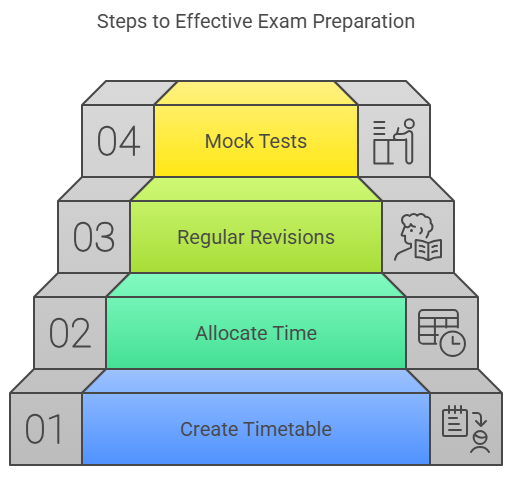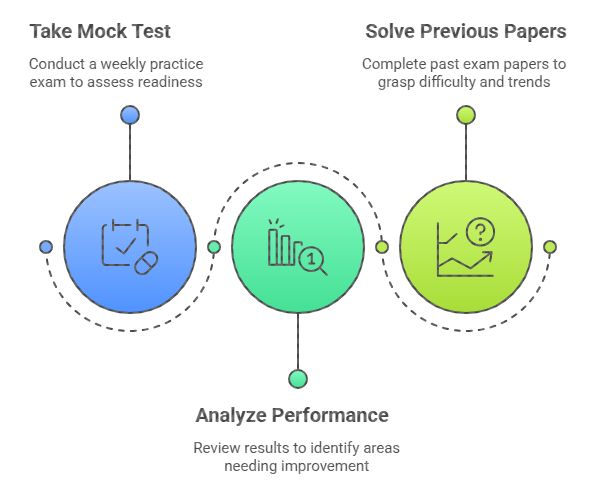Choose Your Language
Government exams are highly competitive and serve as a gateway to prestigious career opportunities. Every year, lakhs of aspirants appear for exams like UPSC, SSC, Banking, Railways, and more, but only a fraction succeed. The primary reason for failure is the avoidable mistakes that many first-time candidates make. If you are preparing for a government exam, learning from the experiences of others can significantly enhance your chances of success.
1. Lack of a Proper Study Plan
One of the most common mistakes aspirants make is starting their preparation without a structured study plan. Without a roadmap, candidates often waste time on irrelevant topics or fail to cover essential areas.
How to Avoid It:
- Create a realistic timetable that includes all subjects and topics.
- Allocate time based on the weightage of different topics in the exam.
- Include regular revisions and mock tests in your schedule.

2. Ignoring the Exam Pattern and Syllabus
Many candidates prepare without understanding the exam pattern and syllabus, leading to incomplete preparation and unexpected surprises on exam day.
How to Avoid It:
- Download the official syllabus and exam pattern from the respective exam body’s website.
- Familiarize yourself with the marking scheme, question types, and time limits.
- Prioritize high-weightage topics first to maximize your score.
3. Over-Reliance on Coaching Institutes
Coaching institutes can provide guidance, but relying solely on them without self-study is a significant mistake. Many aspirants assume that joining a coaching center guarantees success, but personal effort is the key.
How to Avoid It:
- Use coaching as a supplement, not a substitute, for self-study.
- Regularly revise and practice what you learn in coaching classes.
- Take responsibility for your own preparation and self-assessment.
4. Neglecting Current Affairs
Government exams, especially UPSC, SSC, and Banking, place significant emphasis on current affairs. Ignoring this section can lead to a lower overall score.
How to Avoid It:
- Dedicate at least 30 minutes daily to reading newspapers or current affairs magazines.
- Use reliable online sources or apps for daily updates as well as Nexisgrow Current Affairs.
- Revise current affairs regularly to ensure retention.
5. Skipping Mock Tests and Previous Year Papers
Mock tests and previous year question papers are the backbone of effective exam preparation. Avoiding them is like walking into the exam hall blindfolded.
How to Avoid It:
- Take at least one mock test per week to assess your preparation.
- Analyze your performance to identify weak areas and improve upon them.
- Solve previous year papers to understand the exam’s difficulty level and question trends.

6. Overloading with Study Material
Many aspirants make the mistake of collecting excessive books and resources, which leads to confusion and hampers focused preparation.
How to Avoid It:
- Stick to a few trusted sources recommended by toppers or experts.
- Focus on quality study materials rather than quantity.
- Avoid switching between multiple books for the same subject.
7. Poor Time Management During the Exam
Even well-prepared candidates can struggle if they fail to manage their time effectively during the exam.
How to Avoid It:
- Practice solving questions within the allotted time during mock tests.
- Prioritize easy questions first and return to difficult ones later.
- Avoid spending too much time on a single question to prevent time wastage.
8. Underestimating the Importance of Health
Many aspirants neglect their physical and mental health during preparation, leading to burnout, stress, and reduced efficiency.
How to Avoid It:
- Take short breaks during study sessions to refresh your mind.
- Maintain a healthy diet, exercise regularly, and get enough sleep.
- Practice meditation or yoga to manage stress and improve concentration.
9. Not Revising Regularly
Studying new topics without revising previously learned concepts is a common mistake. Without revision, you’re likely to forget essential concepts and struggle during the exam.
How to Avoid It:
- Set aside dedicated time for daily and weekly revisions.
- Use flashcards, notes, or mind maps for quick revisions.
- Focus on weak areas during revision to strengthen your overall preparation.
10. Giving Up After the First Attempt
Many candidates lose motivation after failing their first attempt. However, success in government exams often requires multiple attempts and continuous improvement.
How to Avoid It:
- Treat your first attempt as a learning experience rather than a failure.
- Analyze your mistakes and work on them for the next attempt.
- Stay consistent, motivated, and dedicated throughout your preparation journey.
Final Thoughts
Government exams require not just hard work but also smart work. By avoiding these common mistakes, you can streamline your preparation and significantly improve your chances of success. Remember, every topper was once a beginner who learned from their mistakes. Stay focused, stay disciplined, and keep moving forward.
